
Advertise Contact Privacy
Browse All Reviews
New Releases
List Reviews by Rating
List Reviews by Author
List Reviews by Title


Station Eleven
By emily st. john mandel, civilization in a post-apocalyptic world.
Station Eleven is probably one of the books I recommend most frequently to other people. It’s a beautifully written and lovely story.
Plot Summary
For the Detailed Plot Summary, click here or scroll all the way down .
Station Eleven by Emily St. John Mandel opens at the onset of an outbreak of a virulent flu. In a matter of weeks, it will quickly decimate the world’s population. In its wake is a place that is disconnected, desperate and dangerous, with small communities of people trying to make their way in this brave new world.
The book fast forwards to about fifteen years later. Electricity and water are relics of the past, and kids have now grown up with this being the only world they know. The narrative focuses on a group of performers who travel from community to community in an attempt to bring some meaning to their now unrecognizable lives. This group, known as the Traveling Symphony, arrives at a town expecting to find two former members of their group that had previously decided to stay there. Instead, the disquieting little community is now run by a cult-like leader referred to as the Prophet. A young girl attempting to escape the town provides a clue to where the missing symphony members might be, a place called the Museum of Civilization. They don’t known what they’ll find there or if it even exists, but the group heads off in search anyway.
A second intertwined narrative explores the life of a famous actor, Arthur Leander, who one of the performers has taken up a hobby of collecting mementos about. Leander’s first wife is the author of a comic called Station Eleven.
Book Review
It is a post-apocalyptic tale, but a surprisingly hopeful one, a story of rebuilding and putting the pieces back together again. As the characters converge upon the Museum, the novel explores the many ways groups of people create patchwork societies and norms to help them hobble together something resembling civilization.
Now, admittedly, I’m a sucker for post-apocalyptic tales in general, especially those more firmly rooted in reality. But this one especially struck a chord with me. It’s not particularly fancy or edgy, and there are very little post-modernist literary devices or gimmicks involved. Instead, it’s a well-paced, quickly moving but thoughtful novel that unravels evenly to reveal a story about society and individuals attempting to rebuild a ruined world.
As the story moves forward, it adds dimensions and layers to a well-conceived vision of how this could look. Of course, it’s a short book so it’s not an all-encompassing, epic type of world we’re seeing here. Instead, it’s told from the perspective of a few characters and only hints at how the rest of the world is getting along.
Station Eleven Movie Adaptation
Station Eleven is being adapted into a limited series to be aired on the new HBO Max streaming service (it’s a new service that’s coming out in 2020 that will compete with Netflix, Hulu, etc).
For all the details, see Everything We Know About the Station Eleven Adaptation .
Read it or Skip it?
Station Eleven the type of book that I am generally inclined to recommend to other people, especially casual readers. The subject matter — a realistic dystopia and a musing on civilization and human nature is something most people can get into. It’s accessible, but substantive. And its hopeful, curious and gently lyrical tone make it easily enjoyable to read.
Detailed Book Summary (Spoilers)
Part i: the theater, part ii: a midsummer night's dream, part iii: i prefer you with a crown, part iv: starship, part v: toronto, part vi: the airplanes, part vii: the terminal, part viii: the prophet, part ix: station eleven.
If this summary was useful to you, please consider supporting this site by leaving a tip ( $2 , $3 , or $5 ) or joining the Patreon !
Share this post

She’s Not Sorry
The Seven Year Slip
Darling Girls
Yours Truly
The Coworker
Best Literary Fiction of 2024 (New & Anticipated)
The Housemaid Series Recap
2024’s Best Book Club Books (New & Anticipated)
Bookshelf: Development Diary
Best Rom-Com, Beach Reads & Contemporary Romance Books

Share your thoughts Cancel reply
Bob on Books
Thoughts on books, reading, and life
Review: Station Eleven

Station Eleven , Emily St. John Mandel. New York: Knopf, 2014.
Summary: An account of the end of civilization as we know it after a catastrophic pandemic, and how survivors sought to keep beauty and the memory of what was alive as they struggled against destructive forces to rebuild human society.
Arthur Leander, an accomplished actor who burned through marriages, is on stage in the middle of performing King Lear when his own heart gives out and he dies on stage, despite the effort of a medic in training, Jeevan. Watching is a young child actor, Kirsten Raymonde, who often talked to Arthur. A kind woman takes her aside, noticing an unusual graphic novel of a settlement of survivors on a watery planet, Station Eleven, a gift from Arthur that Kirsten carries for the next twenty years.
That night, as the snow fell on Toronto, was the beginning of the end of civilization. Jeevan’s friend Hua, working at a hospital, calls, urging Jeevan to leave immediately. The hospital is full of flu cases, many but not all from a plane from Russia. Before long, every last one is dead, and all who came in contact are sick, including Hua. None will live. In days, nearly everyone around the world dies. The media goes dead, then the internet, and finally utilities. Planes are grounded. Permanently. Cars run out of gas. Only about one in two hundred and fifty survive.
Emily St. John Mandel, in Station Eleven , imagines a post-pandemic, post-civilization world. Yes, it is a world of predators. Kirsten, a survivor has two knives tattooed on her wrist, the lives taken by her knives. She doesn’t remember her first year, and doesn’t want to. But there are also those who seek to hold on to remnants of beauty. She is part of the Traveling Symphony, a group of musicians and actors on a circuit up and down Michigan, performing great music and the works of Shakespeare.
Some towns reconstitute themselves. And some become dangerous. One, St Deborah by the Water, has been taken over by The Prophet and his cult, a Jonestown-type scenario. The Traveling Symphony escapes, along with a child who stows away to escape becoming another of The Prophet’s brides. This sets up a climactic confrontation.
The story goes back and forth tracing the lives of the people connected to Arthur and that night in Toronto, both before and after the pandemic. We meet Clark, a gay actor friend of Arthur’s, one of the survivors living at the Severn City Airport, where flights had been grounded, turning it into its own community. He becomes a curator of The Museum of Civilization, with artifacts from laptops and smartphones to newspapers, all from the time before the pandemic. There was a former wife of Arthur there as well, with their child, Tyler, who has a disturbing habit of quoting apocalyptic passages from the Bible. They eventually leave. Jeevan eventually walks a thousand miles from Toronto to a settlement in what was Virginia.
And there is Miranda Carroll, the artist of Station Eleven . We learn her story, how she met and married author and wrote and drew Station Eleven, giving Arthur two copies shortly before his death…and hers.
Beyond imagining what a world nearly wiped out by a pandemic might be like (a prescient book, written six years before 2020), Mandel explores the powerful longing to cling to the good and the beautiful, and to human community, even when all else falls apart. She reminds us that the complex thing we call civilization is actually a thin veneer, easily stripped away. The question is, what then remains? When the veneer falls away, will there be brutes or beauties?
And what stories will shape us, and how will we read them? There were two copies of Station Eleven. Kirsten had one, and it profoundly shaped her imagination. We learn that the other copy also shaped an imagination, but quite differently. We’re reminded not only of the power of story but also that no two people read a story in the same way.
One final caveat. Don’t do what I did and read the opening chapters of the book the day before returning home on a plane full of people. Those who have read Station Eleven will understand.
Share this:
One thought on “ review: station eleven ”.
Pingback: The Month in Reviews: April 2023 | Bob on Books
Leave a comment Cancel reply
This site uses Akismet to reduce spam. Learn how your comment data is processed .
"...whatever is true, whatever is honorable, whatever is just, whatever is pure, whatever is pleasing, whatever is commendable, if there is any excellence and if there is anything worthy of praise, think about these things." - Philippians 4:8
thoughts of a preacher, minister, and aspiring theologian
a place where book lovers come to gather
Apokatastasis is but the gospel of Christ's absolute and unconditional love sung in an eschatological key
Pages completely filled with incomplete thoughts.
Essays, poetry, meditations, and book reviews by Jeremy Vogan.
Books | Reflections For the Good of the Church
simply feisty seeds
Explorations in Biblical Theology from J. Richard Middleton
Professional website and blog
Howdy! We're the largest independent bookstore in Texas. This is our blog.
The blog of Academe magazine
"Books are humanity in print." Barbara Tuchman
Commentary on Working-Class Culture, Education, and Politics
Comments on the New Testament and Early Christianity (and related matters)
A book critic's discoveries and recommendations
Communication Strategies for Bridging Differences
Practicing stillness in a busy world
"In faith there is enough light for those who want to believe and enough shadows to blind those who don't." - Blaise Pascal
Becoming More Like Jesus All The Time
IFES Secretary for Dialogue and Social Engagement
crude inky blab
"For we are God's workmanship . . ." - Ephesians 2:10
Exploring life through pilgrimage, literature, and faith

- Already have a WordPress.com account? Log in now.
- Subscribe Subscribed
- Copy shortlink
- Report this content
- View post in Reader
- Manage subscriptions
- Collapse this bar
- International edition
- Australia edition
- Europe edition

Station Eleven review – a beautiful vision of a plague-ravaged planet
What would make life still worth living after the collapse of civilisation? This adaptation of the astonishingly prescient 2014 bestseller is deeply unsettling, even in the bits it gets wrong
H ow deeply strange it is, how deeply unsettling, to be able to compare and contrast a fictional pandemic with the real thing. I read Emily St John Mandel’s bestselling Station Eleven shortly after it came out in 2014, when the tale of a mysterious flu sweeping the globe and laying waste to normal life lay wholly beyond the bounds of reality. Now the television adaptation by Patrick Somerville (known for Maniac and The Leftovers) for HBO, streaming in the UK on Starzplay, is here and … resonating.
Or at least part of it is. There are – as is starting to feel mandatory with small-screen dramas – two timelines. The first concerns the early days and years of the pandemic. Different episodes concentrate on the experiences of different characters, but the through line is young Kirsten (an absolutely extraordinary performance from 13-year-old Matilda Lawler in her first substantial role), a child actor who is abandoned by her chaperone when a stage performance of King Lear is chaotically truncated by the death of the lead, Arthur (Gael García Bernal).
Audience member Jeevan (Himesh Patel) tries to take her home, but they are overtaken by the collapse of civilisation and begin their new life navigating the disaster together. Though “their” plague is much more devastating than ours (it has a 99% fatality rate), it is still quite something to see people coughing in enclosed spaces while those nearby bristle, and others wonder about masks or gather supplies so they can hunker in apartments until the virus has burned itself out. People die alone, with their loved ones unable to be with them, and people grieve alone.
It is almost more discomfiting, however, to be able to point now to moments the creators get wrong. In the very early days, for example, Jeevan and Kirsten go round a supermarket that is full of produce but empty of people. Ah, you say – no. It wasn’t like that.
The second timeline takes us 20 years in the future, when Kirsten (now played by Mackenzie Davis) is part of a troupe of actors known as the Traveling Symphony, who tour the midwest putting on Shakespeare plays – Hamlet, when we meet them – to the scattered plague survivors. Even in 2014, I was sceptical that there would be such an appetite. Now I am more so, but beyond the practical, the questions posed by the book and the show about how much of a refuge art can provide, what we should work to preserve, what makes a civilisation and what, ultimately, makes life worth living, remain interesting ones.
Station Eleven is a slow burn. The first few episodes look beautiful but move at a stately pace. If you can stick with it, you will be rewarded. Having established its Serious Credentials, it gains confidence and begins to move away from the elegiac tone that threatens to overwhelm it. Backstories are filled in – notably of Miranda (Danielle Deadwyler), Arthur’s lover and the author of the graphic novel (called Station Eleven, but don’t let the meta-ness put you off) that has been Kirsten’s lifeline over her 20 years of post-apocalyptic wandering. Lighter moments leaven the darkness, particularly when the irreducibly charismatic and off-kilter Lori Petty, as the troupe’s composer Sarah, is on screen, or when we flash back to pre-pandemic times. “You seem to get reborn almost every time you leave the house,” says Arthur’s best friend, Clark (David Wilmot, another mesmerising turn), after listening to a California female actor be an excessively California female actor over dinner for too long.
Villainry arrives (via the most frightening performance I’ve ever seen, from Daniel Zovatto as the stranger who insists on joining the Traveling Symphony “otherwise your friends are going to start to disappear”), along with the secret community known as the Museum of Civilisation. Further threads arise from the stories of other settlements – one led by Clark and the female actor (Elizabeth, played by Caitlin FitzGerald, who ended up marrying Arthur after an affair they began while he was with Miranda) – and begin to be woven together. We start to plumb the depths of Kirsten’s soul, forged by suffering, saved by the Symphony and ready to save it, too, by any means necessary. We begin, really, to care, to wonder, to ask more questions. To take refuge in the art, dammit.
- Television & radio
Comments (…)
Most viewed.
Advertisement
Supported by
Shakespeare for Survivors
- Share full article

By Sigrid Nunez
- Sept. 12, 2014
Emily St. John Mandel’s fourth novel, “Station Eleven,” begins with a spectacular end. One night, in a Toronto theater, onstage performing the role of King Lear, 51-year-old Arthur Leander has a fatal heart attack. There is barely time for people to absorb this shock when tragedy on a considerably vaster scale arrives in the form of a flu pandemic so lethal that, within weeks, most of the world’s population has been killed.
Among the people on the scene the night of Arthur’s death is Kirsten Raymonde, an 8-year-old actress playing a tiny nonspeaking role as one of Lear’s daughters as a child. (From the author’s acknowledgments, we learn that this addition to Shakespeare’s play is taken from an actual production of “Lear” staged by James Lapine in 2007 at the Public Theater.) When we meet Kirsten again, 20 years have passed and there is no more Toronto. There is no Canada, no United States. All countries and borders have vanished. There remain only scattered small towns.
Kirsten is now part of something called the Traveling Symphony: 20 or so musicians and actors in horse-drawn wagons who roam from town to town in an area around the shores of Lakes Huron and Michigan. At each stop the Symphony entertains the public with concerts and theatrical performances — mostly Shakespeare because, as the troupe has learned, this is what audiences prefer. “People want what was best about the world,” explains one musician. The Symphony has a motto, taken from an episode of “Star Trek: Voyager,” “Survival is insufficient,” and it is this unpoetical line — rather than, as one might expect, a quotation from Shakespeare — that Kirsten calls “my favorite line of text in the world.” Since the age of 15, she has worn it tattooed on her left forearm.
Though her memory of her own mother’s face — and of the days when such things as electricity, gas, running water, pharmaceuticals and the Internet existed — has grown vague, Kirsten has always remembered, to the point of obsession, Arthur Leander. In his prime he had been a Hollywood star, and over the years Kirsten has made a habit of searching any printed matter she happens across for articles about him — mostly celebrity gossip — which she clips and carries about with her in a zip-lock bag. Also in the bag are two much read issues of a comic-book series featuring a character called Dr. Eleven, a physicist who lives on a space station after escaping an alien takeover of Earth. Twenty years have not dimmed Kirsten’s passion for the comics, or her curiosity about their creator, identified only by the initials M.C.
From flashbacks interspersed throughout the novel, we learn about Arthur’s life — mostly the ups and downs of his acting career and of his three marriages, in particular his first, to an art school graduate named Miranda. It is she who created the Dr. Eleven comics, working on them as a hobby over many years during which she achieved professional success as an executive for a shipping company. She once made a present of the first two issues to Arthur, who in turn gave them to little Kirsten. Detailed descriptions of Miranda’s comic-book project, also interspersed throughout, reveal (perhaps a bit too pointedly, for this reader) several parallels between her science fiction stories and events in the novel itself.
The Symphony arrives in a town called St. Deborah by the Water, hoping to reunite with two members of their troupe who had stayed behind after a visit two years earlier because they were expecting a child. But neither the couple nor their child is to be found, and the Symphony is alarmed to discover that the town has come under the control of a religious fanatic known as “the prophet.” Determined to track down their missing friends, the caravan moves on, their destination a former major airport that is now home to more than 300 people and something called the Museum of Civilization, where such old-world artifacts as cellphones, laptops, credit cards and a pair of red stiletto heels are on view. But their encounter with the prophet has put Kirsten and her fellow troupers in serious danger. Their journey is threatened by a succession of misadventures, and a showdown with their enemy becomes inevitable.
Mandel is an able and exuberant storyteller, and many readers will be won over by her nimble interweaving of her characters’ lives and fates. Two other survivors whose stories are deftly tied in are Arthur’s closest male friend, who manages to find purpose in his role as an elder resident of the airport settlement, and a paramedic, first seen performing CPR on the actor on the night of his death, who yearns to make amends for a previous career as a cheap paparazzo (whose prey happened to include Arthur and Miranda).
“Station Eleven” is as much a mystery as it is a post-apocalyptic tale, and Mandel is especially good at planting clues and raising the kind of plot-thickening questions that keep the reader turning pages. Why does the prophet own a dog with the same name as a dog owned by Dr. Eleven? What is the meaning of the two black knives tattooed on Kirsten’s wrist? Who is this “V.” to whom Arthur has written a slew of letters over the years? If Mandel has to rely heavily on coincidence to bring certain parts off, she does so with satisfying panache.
Where the book falters, I think, is in its imagination of disaster. Having accepted the science that says a flu pandemic is highly probable in our future, Mandel chooses a worst possible situation, a plague that results in the immediate and total collapse of civilization. But the survivors do not think, act or speak like people struck by such a cataclysm. For the most part, they do not behave very differently from people living in ordinary, civilized times. Hunger, thirst and exhaustion are alluded to, but there is no penetrating sense of the day-to-day struggle of vulnerable human beings lacking the basic amenities of life. Also, although we are presented with a significant villain in the figure of the prophet, readers may wonder why few bad guys appear to have made it to Year 20.
We are living in a time that has been extraordinary for outbreaks of violence and chaos all over the world, when news of carnage in places like Ukraine, Nigeria and the Middle East, and of the horrendous conditions that have turned tens of thousands of Central American children into desperate migrants, has been overwhelming. Reading Mandel’s novel, I did not feel as if I was in the presence of that kind of suffering. The hairs never rose on the back of my neck; my eyes never filled with tears.
Survival may indeed be insufficient, but does it follow that our love of art can save us? If “Station Eleven” reveals little insight into the effects of extreme terror and misery on humanity, it offers comfort and hope to those who believe, or want to believe, that doomsday can be survived, that in spite of everything people will remain good at heart, and that when they start building a new world they will want what was best about the old.
STATION ELEVEN
By Emily St. John Mandel
333 pp. Alfred A. Knopf. $24.95.
Sigrid Nunez’s most recent book, “Sempre Susan: A Memoir of Susan Sontag,” will be released in paperback in October.
Explore More in Books
Want to know about the best books to read and the latest news start here..
As book bans have surged in Florida, the novelist Lauren Groff has opened a bookstore called The Lynx, a hub for author readings, book club gatherings and workshops , where banned titles are prominently displayed.
Eighteen books were recognized as winners or finalists for the Pulitzer Prize, in the categories of history, memoir, poetry, general nonfiction, fiction and biography, which had two winners. Here’s a full list of the winners .
Montreal is a city as appealing for its beauty as for its shadows. Here, t he novelist Mona Awad recommends books that are “both dreamy and uncompromising.”
The complicated, generous life of Paul Auster, who died on April 30 , yielded a body of work of staggering scope and variety .
Each week, top authors and critics join the Book Review’s podcast to talk about the latest news in the literary world. Listen here .
- Member Login
- Library Patron Login
SUBSCRIBE TO OUR
FREE NEWSLETTERS
Search: Title Author Article Search String:
Reviews of Station Eleven by Emily St. John Mandel
Summary | Excerpt | Reading Guide | Reviews | Beyond the book | Read-Alikes | Genres & Themes | Author Bio
Station Eleven
by Emily St. John Mandel
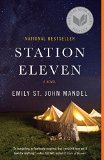
Critics' Opinion:
Readers' Opinion:
- Speculative, Sci-Fi, Fantasy, Alt. History
- Midwest, USA
- Ind. Mich. Ohio
- Contemporary
- Dealing with Loss
- Top 20 Best Books of 2014
Rate this book
About this Book
- Reading Guide
Book Summary
An audacious, darkly glittering novel set in the eerie days of civilization's collapse, Station Eleven tells the spellbinding story of a Hollywood star, his would-be savior, and a nomadic group of actors roaming the scattered outposts of the Great Lakes region, risking everything for art and humanity.
One snowy night a famous Hollywood actor slumps over and dies onstage during a production of King Lear . Hours later, the world as we know it begins to dissolve. Moving back and forth in time-from the actor's early days as a film star to fifteen years in the future, when a theater troupe known as the Traveling Symphony roams the wasteland of what remains - this suspenseful, elegiac, spellbinding novel charts the strange twists of fate that connect five people: the actor, the man who tried to save him, the actor's first wife, his oldest friend, and a young actress with the Traveling Symphony, caught in the crosshairs of a dangerous self-proclaimed prophet. Sometimes terrifying, sometimes tender, Station Eleven tells a story about the relationships that sustain us, the ephemeral nature of fame, and the beauty of the world as we know it.
Excerpt Station Eleven
Jeevan's understanding of disaster preparedness was based entirely on action movies, but on the other hand, he'd seen a lot of action movies. He started with water, filled one of the oversized shopping carts with as many cases and bottles as he could fit. There was a moment of doubt on the way to the cash registers, straining against the weight of the cart—was he overreacting?—but there was a certain momentum now, too late to turn back. The clerk raised an eyebrow but said nothing. "I'm parked just outside," he said. "I'll bring the cart back." The clerk nodded, tired. She was young, early twenties probably, with dark bangs that she kept pushing out of her eyes. He forced the impossibly heavy cart outside and half-pushed, half-skidded through the snow at the exit. There was a long ramp down into a small park-like arrangement of benches and planters. The cart gained speed on the incline, bogged down in deep snow at the bottom of the ...
Please be aware that this discussion guide will contain spoilers!
- Now that you've read the entire novel, go back and reread the passage by Czeslaw Milosz that serves as an epigraph. What does it mean? Why did Mandel choose it to introduce Station Eleven?
- Does the novel have a main character? Who would you consider it to be?
- Arthur Leander dies while performing King Lear, and the Traveling Symphony performs Shakespeare's works. On page 57, Mandel writes, "Shakespeare was the third born to his parents, but the first to survive infancy. Four of his siblings died young. His son, Hamnet, died at eleven and left behind a twin. Plague closed the theaters again and again, death flickering over the landscape." How do Shakespearean motifs coincide with those of Station Eleven, both the novel and the ...
- "Beyond the Book" articles
- Free books to read and review (US only)
- Find books by time period, setting & theme
- Read-alike suggestions by book and author
- Book club discussions
- and much more!
- Just $45 for 12 months or $15 for 3 months.
- More about membership!
Media Reviews
Reader reviews, bookbrowse review.
Everyone in the post-collapse world has lost someone; most have lost entire families, friends and lovers. Still, somehow, art persists – stories, drawings, music, and even Shakespearean language. "What was lost in the collapse: almost everything, almost everyone, but there is still such beauty." Mandel reminds readers to be grateful for all we possess and warns us how fragile this seemingly impervious technology-driven life actually is... continued
Full Review (778 words) This review is available to non-members for a limited time. For full access, become a member today .
(Reviewed by Rebecca Foster ).
Write your own review!
Beyond the Book
A big year for dystopias.
When Emily St. John Mandel was auctioning her novel, Station Eleven , in 2013, she was worried that the world was sick of dystopian fiction. "When I started writing, there were a few literary post-apocalyptic novels, but not quite the incredible glut that there is now…I was afraid the market might be saturated." Luckily for Mandel, the public is still hungry for speculative fiction; her book was sold for a six-figure advance. Science fiction writer Robert Heinlein coined the term "speculative fiction" in a 1947 essay . Broadly understood, it refers to stories that contain futuristic, fantastical, and/or supernatural elements. Some of the seminal works of speculative fiction are George Orwell's 1984 and Aldous Huxley's Brave New World...
This "beyond the book" feature is available to non-members for a limited time. Join today for full access.
Read-Alikes
- Genres & Themes
If you liked Station Eleven, try these:

I Cheerfully Refuse
by Leif Enger
Published 2024
About this book
More by this author
A career defining tour-de-force from New York Times bestselling, award-winning and "formidably gifted" ( Chicago Tribune ) author of Peace Like a River Leif Enger.
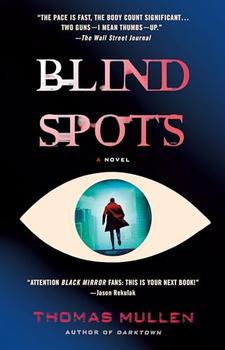
Blind Spots
by Thomas Mullen
A riveting crime novel with a speculative edge about the ways our perceptions of reality can be manipulated.
Books with similar themes
Support bookbrowse.
Join our inner reading circle, go ad-free and get way more!
Find out more
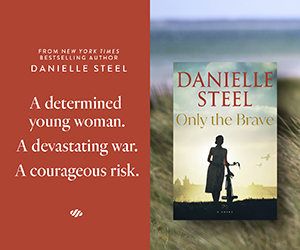
BookBrowse Book Club
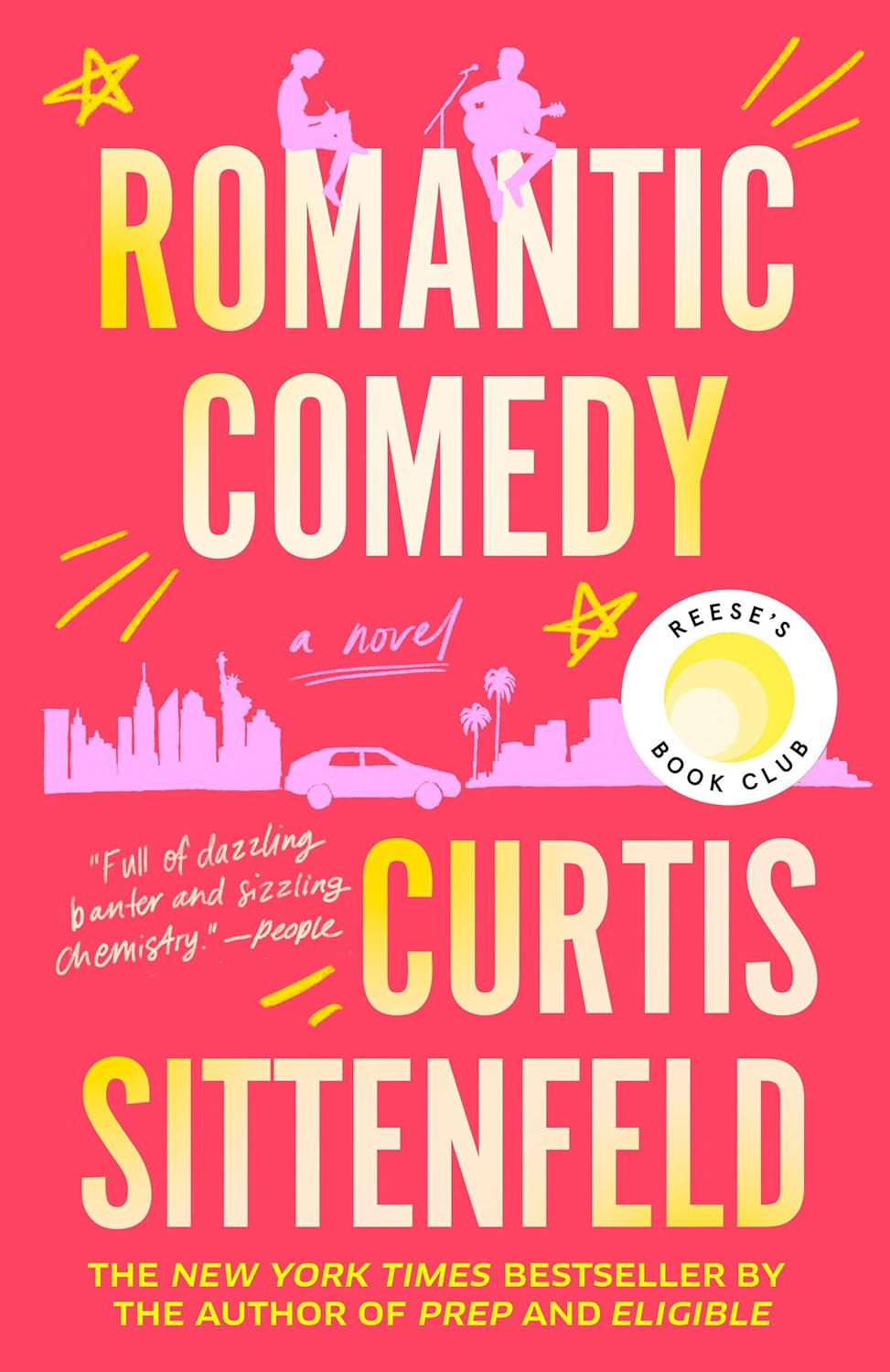
Members Recommend
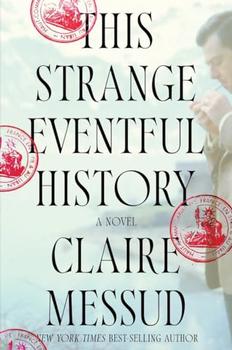
This Strange Eventful History by Claire Messud
An immersive, masterful story of a family born on the wrong side of history.
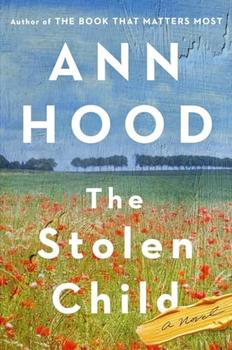
The Stolen Child by Ann Hood
An unlikely duo ventures through France and Italy to solve the mystery of a child’s fate.
Win This Book
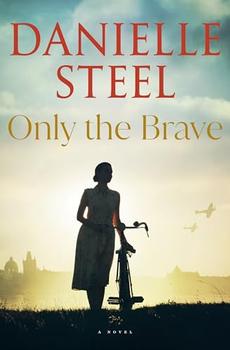
Only the Brave by Danielle Steel
A powerful, sweeping historical novel about a courageous woman in World War II Germany.
Solve this clue:
and be entered to win..
Your guide to exceptional books
BookBrowse seeks out and recommends the best in contemporary fiction and nonfiction—books that not only engage and entertain but also deepen our understanding of ourselves and the world around us.
Subscribe to receive some of our best reviews, "beyond the book" articles, book club info and giveaways by email.
- Newsletters
- Account Activating this button will toggle the display of additional content Account Sign out
HBO Just Released the Spiritual Successor to The Leftovers
The beautiful station eleven changes the post-apocalyptic novel on which it’s based, often for the better..
There’s a delightful scene in the otherwise justly forgotten 2002 post-apocalyptic movie Reign of Fire , in which a group of burlap-clad peasant children watch spellbound as two men perform a dramatic sword fight on a candlelit stage. Only toward the end of this medieval-looking diversion does it become clear that the adults are acting out the famous scene from The Empire Strikes Back in which Darth Vader informs Luke Skywalker just how closely the two of them are related. Even in a world laid waste by fire-breathing dragons (yes, dragons), it seems, some stories are immortal.
This is essentially the premise of Emily St. John Mandel’s 2014 novel, Station Eleven , in which a troupe of roaming players perform Shakespeare to a series of little settlements established in the aftermath of a highly lethal global pandemic. The new HBO 10-episode limited series based on the novel may believe in immortal stories, but it makes so many changes to Mandel’s novel that it probably doesn’t count Station Eleven among them. Both novel and series are less survivalist action-adventure than ruminations on what makes human lives meaningful, what we’d choose to save when losing everything. But their answers are not the same.
The flu that rips through the world in Station Eleven has only a 1 percent survival rate, so after it strikes, infecting and killing its victims within a few days, it burns itself out, leaving behind a handful of people who managed to isolate themselves in time. All of the central characters in the story are linked to Arthur Leander (Gael García Bernal), a movie star who dies of a heart attack onstage in Chicago while playing King Lear, just before the pandemic starts. Sizable chunks of the timeline-hopping story describe life “before” and just after the flu strikes.
One character, Arthur’s first wife, Miranda (Danielle Deadwyler), is a shipping industry executive who works on a graphic novel about a lonesome spaceman called Captain Eleven in her spare time. Another, Kirsten (Matilda Lawler), is a child actor from the Lear production who remembers Arthur’s kindness and cherishes the copy of Miranda’s self-published book that he gave her. After Arthur dies, an audience member, Jeevan (Himesh Patel), tries to help 8-year-old Kirsten get home from the theater. When her parents turn out to be unreachable and probably dead, Kirsten joins Jeevan and his disabled brother (Nabhaan Rizwan) in a high-rise condo, where they hole up with hoarded supplies for the first months of the pandemic’s aftermath. In yet another storyline, Arthur’s best friend, Clark (David Wilmot), and second wife (Caitlin FitzGerald) get stranded in a small airport where a few dozen of the uninfected must form a new community. There, Elizabeth and Arthur’s son, like Kirsten, spends much of his time reading and rereading Miranda’s comics.
Other parts of the story take place 20 years or so after the pandemic. There’s no electricity or running water and all fuel reserves have been exhausted, so the Traveling Symphony (which also features a small orchestra) has to rely on horses to pull their wagons from town to town. The intervening years have been harrowing, and the now-grown Kirsten (Mackenzie Davis) has become a whiz at throwing hunting knives at potential attackers, but a tentative peace has settled over the land. To emphasize how fragile it is, the series provides a clever visual aid, a painted wooden map with Lake Michigan at its center. The map can be rotated to follow the circular route of the Symphony, outlined around the lake’s circumference. “We don’t go off the wheel,” the players explain to a new member, because the world outside the wheel isn’t safe.
It’s worth pointing out that neither the novel nor the TV adaptation of Station Eleven offers a plausible post-apocalyptic scenario. Mandel has survivors killing one another over backpacks in a world where there are far more backpacks (and pretty much every other material resource) than the remaining residents will ever need. The symphony is impractically large for a troupe that apparently survives off of the largess of the tiny encampments that actually grow fresh food. (We are never told or shown how or if the symphony gets paid.) Miranda’s comic seems to be the only book anyone ever reads—even those survivors camped out in the airport terminal, which ought to be rich in Nora Roberts and Liane Moriarty paperbacks. Last but not least, Captain Eleven is no Luke Skywalker. From what we’re told of the comic, it seems remarkably short on action, its characters spending all their time musing over the past and intoning Beckett-esque lines like “I don’t want to live the wrong life and then die.” This does not strike me as catnip for the 8-year-old imagination. When, in extremis, an exasperated Jeevan flips through Kirsten’s copy of the book and moans, “It’s so pretentious ,” the series earned its only laugh from me.
Showrunner Patrick Somerville and other writers who worked on the series are alumni of The Leftovers , an HBO series which might have provoked a similar cry from Jeevan. Like The Leftovers, this version of Station Eleven is melancholy, enigmatic, character-driven, and ravishing. The end of the world is exquisitely photographed, whether it’s images of a theater or hotel room segueing into the same place, years later, taken over by grass, ferns, and animals, or the eerily vast, dim, low-ceilinged spaces of a chain department store that’s been converted into a post-apocalyptic birthing center. In the early episodes of the series, the stark beauty of the ruined world the characters inhabit is fully capable of carrying the show, but it doesn’t need to. Strong performances all around, particularly from Lawler as the child Kirsten, and scripts grounded in the characters’ relationships make every episode indelible.
Things start to disintegrate toward the end, unfortunately. The series creators have seen fit to make major alterations to Mandel’s plot, some astute, others simply confusing. Jeevan and Kirsten meet only glancingly in the novel. The series makes the inspired move of having him save her and become her surrogate parent until they are unwillingly separated. The terror of this sudden responsibility for another life transforms Jeevan and produces some of the series’ best writing and acting. In a less successful change, the novel’s main antagonist, a self-styled prophet running a local cult, has been transformed into a more ambiguous figure. His motives make no sense until you realize that the series, in search of more drama than Mandel’s novel can supply, is setting up a performance of Hamlet in the airport as a climactic moment.
There’s usually an element of wish fulfillment in any post-apocalyptic narrative. In Mandel’s novel, Arthur is an artist corrupted by celebrity culture, wealth, and a decadent abundance of choice that makes him incapable of fully committing to any woman as well as neglectful of his son. By contrast, the members of the Traveling Symphony are pure and, more important, so are their audiences, who have mysteriously lost their appetite for pop culture and clamor for the Bard. Miranda’s comic—perhaps the purest artistic work in the story, because it is made with no audience in mind besides its own creator—may come in a genre package, but it is as sedate, mournful, and brooding as any work of literary fiction. Just as Jeevan, a former paparazzo, redeems himself by becoming a doctor after the pandemic, audiences who used to clamor for trash, having been taught what really matters by catastrophe and hardship, have corrected their taste.
Some of this theme gets picked up by the creators of the Station Eleven series, but cinematic depictions of the importance of art can be hard to pull off without the result coming across as annoyingly self-important. On the page, the Traveling Symphony is suffused with Arcadian romance; on the screen, they’re show-offy theater hippies. The series seems oddly unconcerned with portraying the enduring power of Shakespeare’s work, but then what writer wants to fill his screenplay with testimonials to another, long-dead writer with whom he can never hope to compete? Among the many changes the series makes to the novel is the introduction of a mantra, repeated by the prophet: “There’s no before.” In contrast to Clark, who assembles a “museum of civilization” in the former air traffic controllers’ tower featuring displays of defunct technology, the prophet wants to erase the memory of “before” and start anew, with followers who were born after the pandemic.
The notion that the survivors must exorcise the past that haunts them appears to be one the series itself endorses. Along with the prophet—who harbors some unresolved grievances of his own—the other characters have to stop looking backward if they want to do more than just survive. This idea has, obviously, plenty of resonance for viewers currently working out our own complicated, yearning relationship to “before.” But it’s a counterintuitive message to draw from Mandel’s novel, a book in which all of the culture of significance belongs to “before,” and in which only death on an incomprehensible scale and a hardscrabble life can persuade the rude public to appreciate serious, quality art. As for the viewers of this world, whose sufferings have yet to match those of the characters of Station Eleven, a few will surely appreciate this moody, beautiful, and moving, if muddled, adaptation. The rest will probably still prefer The Walking Dead.
We're always looking to improve your experience. Please Email us your feedback .
Our website requires JavaScript to function properly. Please enable JavaScript in your browser settings. If you need assistance, here's how to enable JavaScript .

Reading & Libraries
- Books, Authors and Reading: Reading and Libraries
- Reading Features
- Inspire Online Book Club
Station Eleven Book Review's
Every month we ask our readers for their review of our Book Club title.
TK's review of Station Eleven

TK's Book Rating 5/5
This post-apocalyptic novel is incredibly and powerfully complex with parallels steadfastly embedded in Shakespeare's tragedy ‘King Lear’, Miranda's work of science fiction ‘Station Eleven’ and one’s own recent experience of the Covid pandemic; each section is deftly woven into the next, thus ensuring that we never lose sight of the narratives running alongside each other. Written in the third person narrative with numerous flashbacks and flash forwards, it is undoubtedly a dystopian masterpiece that not only entertains but prompts repeated reflection upon one's perception of the true meaning of life. Such is also highlighted in the reference pertaining to a quotation from ‘Star Trek’: “…because survival is insufficient …”; regret and searching for that which has been lost are dominant themes. One is enraptured from beginning to end with imagery, action and suspense exploding like kaleidoscopic fireworks in this narrative spanning the most woeful spectrum of human experience: loss, oppression, regret, isolation, mortality, terror, confusion, and a myriad of potent emotional experiences that never fail to elicit a lasting interaction. It is harrowing and haunting in its tragic and brutal integrity of reality whilst synchronously portraying the majestic beauty of all that mankind treasures: human interaction, the virtuosity of the multitudinous guises of artistic performance, planet Earth and its opulent diversity of flora and fauna. It shocks, it nudges one’s conscience, it propels one to consider one’s own mortality and painful nostalgia for a ‘lost world’ but it never shrouds the truth in platitudes or pretensions. An evocative and tangible sense of urgency and panic is intertwined with tendrils of hope for the future. The characters are well-defined and authentic; it is through the sub-plots that Mandel allows one insight into their internal conflicts. Arthur, playing King Lear, is uncannily like him; they are both obsessed with power and ego, constantly seeking affirmation from others. Their self-absorption results in them discarding and hurting those most dear to them; it is only when facing death that they come to realise the futility of their lives and ambitions, and experience true regret for their actions. Lear alienates himself from Cordelia, the daughter who loves him the most; Arthur, too, is filled with regret as he realises that he has been chasing fame and fortune rather than focusing on love and friendship. In contrast to The Travelling Symphony’s message of creation and hope, the prophet as founder of the cult, is an extremist and fundamentalist, representing fanaticism and destruction; the sense of powerlessness that he creates in his coerced followers is echoed throughout the novel in the impact of the pandemic. Despite his death in the opening chapter, Arthur remains a central and defining figure throughout, drawing all characters and events together; his list of treasured things parallels the list of things at the beginning of the novel that have been lost since the world ended. Due to Mandel’s magnificent penmanship the narrative has now turned full circle. The experience of having journeyed with these characters will forever remain etched in memory.
Anne's review of Station Eleven
Anne's Book Rating 3/5
Not a book for the faint-hearted in this time of a pandemic. I stopped reading part way through but then returned to it. Moving backwards and forwards in time makes the depressing scenario more palatable and hope slowly emerges. The story is cleverly constructed, with threads gradually coming together. Although the characters have some interesting aspects, I did not find them generally empathetic. Overall, I am glad I finished the book but would only recommend it selectively.

Clare Batten's review of Station Eleven
Clare Battens book rating 3/5
Very easy to read . Not sure I would class it as science fiction.
You might also be interested in:

Fantastic Festivals: Sutton-in-Ashfield Library
Take front row seats as we explore some well-known festivals (and great music!) and give children …
Fantastic Festivals: Bingham Library

Author Event: Writing Women Back into History - Joanna Courtney / Anna Stewart in Conversation
Join historical author Jo Barnden (writes as Joanna Courtney and Anna Stewart) in conversation as s…

Join Nottinghamshire libraries – FREE
By becoming a library member you will be able to borrow books and items for FREE in libraries across the county, including mobiles. You can also access eResources, Ancestry and more!
Not a member yet? Join us - become a library member
- ADMIN AREA MY BOOKSHELF MY DASHBOARD MY PROFILE SIGN OUT SIGN IN
Awards & Accolades
Our Verdict
Kirkus Reviews' Best Books Of 2014
New York Times Bestseller
National Book Award Finalist

STATION ELEVEN
by Emily St. John Mandel ‧ RELEASE DATE: Sept. 9, 2014
Mandel’s solid writing and magnetic narrative make for a strong combination in what should be a breakout novel.
Survivors and victims of a pandemic populate this quietly ambitious take on a post-apocalyptic world where some strive to preserve art, culture and kindness.
In her fourth novel, Mandel ( The Lola Quartet , 2012, etc.) moves away from the literary thriller form of her previous books but keeps much of the intrigue. The story concerns the before and after of a catastrophic virus called the Georgia Flu that wipes out most of the world’s population. On one side of the timeline are the survivors, mainly a traveling troupe of musicians and actors and a stationary group stuck for years in an airport. On the other is a professional actor, who dies in the opening pages while performing King Lear , his ex-wives and his oldest friend, glimpsed in flashbacks. There’s also the man—a paparazzo-turned-paramedic—who runs to the stage from the audience to try to revive him, a Samaritan role he will play again in later years. Mandel is effectively spare in her depiction of both the tough hand-to-mouth existence of a devastated world and the almost unchallenged life of the celebrity—think of Cormac McCarthy seesawing with Joan Didion. The intrigue arises when the troupe is threatened by a cult and breaks into disparate offshoots struggling toward a common haven. Woven through these little odysseys, and cunningly linking the cushy past and the perilous present, is a figure called the Prophet. Indeed, Mandel spins a satisfying web of coincidence and kismet while providing numerous strong moments, as when one of the last planes lands at the airport and seals its doors in self-imposed quarantine, standing for days on the tarmac as those outside try not to ponder the nightmare within. Another strand of that web is a well-traveled copy of a sci-fi graphic novel drawn by the actor’s first wife, depicting a space station seeking a new home after aliens take over Earth—a different sort of artist also pondering man’s fate and future.
Pub Date: Sept. 9, 2014
ISBN: 978-0-385-35330-4
Page Count: 320
Publisher: Knopf
Review Posted Online: June 16, 2014
Kirkus Reviews Issue: July 1, 2014
LITERARY FICTION | SCIENCE FICTION | APOCALYPTIC & POST APOCALYPTIC SCI-FI
Share your opinion of this book
More by Emily St. John Mandel

BOOK REVIEW
by Emily St. John Mandel

More About This Book

BOOK TO SCREEN
Station Eleven Miniseries to Star Mackenzie Davis

SEEN & HEARD

by Max Brooks ‧ RELEASE DATE: June 16, 2020
A tasty, if not always tasteful, tale of supernatural mayhem that fans of King and Crichton alike will enjoy.
Are we not men? We are—well, ask Bigfoot, as Brooks does in this delightful yarn, following on his bestseller World War Z (2006).
A zombie apocalypse is one thing. A volcanic eruption is quite another, for, as the journalist who does a framing voice-over narration for Brooks’ latest puts it, when Mount Rainier popped its cork, “it was the psychological aspect, the hyperbole-fueled hysteria that had ended up killing the most people.” Maybe, but the sasquatches whom the volcano displaced contributed to the statistics, too, if only out of self-defense. Brooks places the epicenter of the Bigfoot war in a high-tech hideaway populated by the kind of people you might find in a Jurassic Park franchise: the schmo who doesn’t know how to do much of anything but tries anyway, the well-intentioned bleeding heart, the know-it-all intellectual who turns out to know the wrong things, the immigrant with a tough backstory and an instinct for survival. Indeed, the novel does double duty as a survival manual, packed full of good advice—for instance, try not to get wounded, for “injury turns you from a giver to a taker. Taking up our resources, our time to care for you.” Brooks presents a case for making room for Bigfoot in the world while peppering his narrative with timely social criticism about bad behavior on the human side of the conflict: The explosion of Rainier might have been better forecast had the president not slashed the budget of the U.S. Geological Survey, leading to “immediate suspension of the National Volcano Early Warning System,” and there’s always someone around looking to monetize the natural disaster and the sasquatch-y onslaught that follows. Brooks is a pro at building suspense even if it plays out in some rather spectacularly yucky episodes, one involving a short spear that takes its name from “the sucking sound of pulling it out of the dead man’s heart and lungs.” Grossness aside, it puts you right there on the scene.
Pub Date: June 16, 2020
ISBN: 978-1-9848-2678-7
Page Count: 304
Publisher: Del Rey/Ballantine
Review Posted Online: Feb. 9, 2020
Kirkus Reviews Issue: March 1, 2020
GENERAL SCIENCE FICTION & FANTASY | GENERAL THRILLER & SUSPENSE | SCIENCE FICTION
More by Max Brooks

by Max Brooks

THE THREE-BODY PROBLEM
From the remembrance of earth's past series , vol. 1.
by Cixin Liu ; translated by Ken Liu ‧ RELEASE DATE: Nov. 11, 2014
Remarkable, revelatory and not to be missed.
Strange and fascinating alien-contact yarn, the first of a trilogy from China’s most celebrated science-fiction author.
In 1967, at the height of the Cultural Revolution, young physicist Ye Wenjie helplessly watches as fanatical Red Guards beat her father to death. She ends up in a remote re-education (i.e. forced labor) camp not far from an imposing, top secret military installation called Red Coast Base. Eventually, Ye comes to work at Red Coast as a lowly technician, but what really goes on there? Weapons research, certainly, but is it also listening for signals from space—maybe even signaling in return? Another thread picks up the story 40 years later, when nanomaterials researcher Wang Miao and thuggish but perceptive policeman Shi Qiang, summoned by a top-secret international (!) military commission, learn of a war so secret and mysterious that the military officers will give no details. Of more immediate concern is a series of inexplicable deaths, all prominent scientists, including the suicide of Yang Dong, the physicist daughter of Ye Wenjie; the scientists were involved with the shadowy group Frontiers of Science. Wang agrees to join the group and investigate and soon must confront events that seem to defy the laws of physics. He also logs on to a highly sophisticated virtual reality game called “Three Body,” set on a planet whose unpredictable and often deadly environment alternates between Stable times and Chaotic times. And he meets Ye Wenjie, rehabilitated and now a retired professor. Ye begins to tell Wang what happened more than 40 years ago. Jaw-dropping revelations build to a stunning conclusion. In concept and development, it resembles top-notch Arthur C. Clarke or Larry Niven but with a perspective—plots, mysteries, conspiracies, murders, revelations and all—embedded in a culture and politic dramatically unfamiliar to most readers in the West, conveniently illuminated with footnotes courtesy of translator Liu.
Pub Date: Nov. 11, 2014
ISBN: 978-0-7653-7706-7
Page Count: 400
Publisher: Tor
Review Posted Online: Oct. 4, 2014
Kirkus Reviews Issue: Oct. 15, 2014
SCIENCE FICTION
More In The Series

by Cixin Liu ; translated by Ken Liu

by Cixin Liu ; translated by Joel Martinsen
More by Cixin Liu

by Cixin Liu ; translated by Various

- Discover Books Fiction Thriller & Suspense Mystery & Detective Romance Science Fiction & Fantasy Nonfiction Biography & Memoir Teens & Young Adult Children's
- News & Features Bestsellers Book Lists Profiles Perspectives Awards Seen & Heard Book to Screen Kirkus TV videos In the News
- Kirkus Prize Winners & Finalists About the Kirkus Prize Kirkus Prize Judges
- Magazine Current Issue All Issues Manage My Subscription Subscribe
- Writers’ Center Hire a Professional Book Editor Get Your Book Reviewed Advertise Your Book Launch a Pro Connect Author Page Learn About The Book Industry
- More Kirkus Diversity Collections Kirkus Pro Connect My Account/Login
- About Kirkus History Our Team Contest FAQ Press Center Info For Publishers
- Privacy Policy
- Terms & Conditions
- Reprints, Permission & Excerpting Policy
© Copyright 2024 Kirkus Media LLC. All Rights Reserved.
Popular in this Genre
Hey there, book lover.
We’re glad you found a book that interests you!
Please select an existing bookshelf
Create a new bookshelf.
We can’t wait for you to join Kirkus!
Please sign up to continue.
It’s free and takes less than 10 seconds!
Already have an account? Log in.
Trouble signing in? Retrieve credentials.
Almost there!
- Industry Professional
Welcome Back!
Sign in using your Kirkus account
Contact us: 1-800-316-9361 or email [email protected].
Don’t fret. We’ll find you.
Magazine Subscribers ( How to Find Your Reader Number )
If You’ve Purchased Author Services
Don’t have an account yet? Sign Up.
‘Station Eleven’ Is a Thrilling but Oddly Paced Adaptation: TV Review
By Daniel D'Addario
Daniel D'Addario
Chief TV Critic
- The Rise and Fall of O.J. Simpson Changed Media Culture Forever 1 month ago
- Conan O’Brien’s Return to ‘The Tonight Show’ Was Melancholy, Powerful TV 1 month ago
- ‘Curb Your Enthusiasm’ Finale: A ‘Seinfeld’ Throwback, Plus Charm, Minus Structure 1 month ago

Years into the COVID-19 pandemic, “ Station Eleven ” suggests we got off easy.
Both the 2014 novel by Emily St. John Mandel and its limited-series adaptation on HBO Max tell the story of a viral plague that decimates the world’s population too quickly for any response. Novel and TV show alike depict both the first moments of global spread and the state of things 20 years on, in a hardscrabble world where humanity’s remnants seek moments of poetry.
Admirers of the timeline-hopping book will be pleased to know that this adaptation, created by Patrick Somerville, attempts to keep Mandel’s style alive. In the main story, an actor named Kirsten (Mackenzie Davis), who’d lived through the beginning of the flu crisis as a child (played in flashback by Matilda Lawler), journeys the Midwest with her performance troupe, the Traveling Symphony. That series-long arc is studded with flashbacks to folks tied, closely or loosely, to Kirsten; the Symphony’s performances maintain a link to the past, pushing away for a moment the narrowness and constraint of life after plague.
The show is strikingly directed by helmers including Hiro Murai, Jeremy Podeswa, Helen Shaver, and Lucy Tcherniak, with compositions evoking the wideness of a feral American landscape or the chill of an abandoned airport. Davis is an able lead, and I was taken with Danielle Deadwyler as Miranda, a supply chain expert (yes, really) who encounters, in the early days of cataclysm, a rare situation that she cannot master.
Popular on Variety
What’s missing, though, is narrative control — one of Mandel’s great gifts as a novelist. Chunkily paced, the flashbacks can appear random, and viewers coming in cold are likely to wonder why we’re spending time with, say, Gael García Bernal’s vain-actor character. Yes, he plays a role in Kirsten’s story (and Miranda’s, for that matter), but this “Station Eleven” struggles at times to draw meaning out of simple proximity. A sense of uncertainty about how to make the sweeping novel the right size for TV haunts the lengthy series, and some elisions do harm. A fiction within the series — a comic book that gives “Station Eleven” its title — is only fleetingly drawn, and its significance doesn’t fully land.
For all this, “Station Eleven” conjures its mood well: Existence after the world falls away is conveyed as both perilous and painfully boring. And although these characters have had a far worse pandemic experience than we have, there’s reason for viewers in our divided times to watch and feel a sort of envy. Working together, the Symphony finds a strange joy in living through the end times. The depiction of theatrical performance here is moving — suggesting a power in connection, through storytelling, that sustains under the worst of circumstances. That spirit shines through a flawed but bighearted adaptation.
“Station Eleven” debuts on HBO Max on Thursday, Dec. 16.
HBO Max. Ten episodes (all screened for review).
- Production: Executive producers: Patrick Somerville, Scott Steindorff, Scott Delman, Dylan Russell, Jessica Rhoades, Hiro Murai, Jeremy Podeswa, and Nate Matteson.
- Cast: Mackenzie Davis, Himesh Patel, Daniel Zovatto , David Wilmot, Matilda Lawler, Philippine Velge, Nabhaan Rizwan, Lori Petty, Gael García Bernal, Danielle Deadwyler.
More From Our Brands
Biden appointee becomes first jewish staffer to resign over gaza, the new kawasaki ninja h2r superbike is the world’s most powerful motorcycle, nfl playoff rematches, christmas games highlight 2024 schedule, the best loofahs and body scrubbers, according to dermatologists, chicago fire says an emotional goodbye to boden in finale promo, verify it's you, please log in.

REVIEW: Station Eleven by Emily St. John Mandel
- Book Reviews
- March 21, 2020
- By Elizabeth Tabler

Station Eleven by Emily St. John Mandel takes the best parts of the dystopian science fiction and fantasy genre and does one thing most books can’t, give the reader hope. Generally, In speculative fiction, I think we as readers forget that to survive humans must do more than living, humans need to thrive. Humans need to explore and challenge ourselves, to watch sunsets, be moved, and feel joy. Humans need more than to breathe. Good fiction knows this but great fiction, like Station Eleven, explores this.
“Survival is insufficient.”
The story of Station eleven starts with multiple endings.
- A play of King Lear at a Toronto Theater where 51-year-old Arthur Leander has his final moments on stage after suffering a major heart attack. That was his end.
- A man runs on to the stage and attempts to save Arthur. In this moment of heroism, his wandering has ceased. It has ended. He has found his calling.
- A little girl watches the death of Arthur followed by the end of life as she knows it. Her childhood has ended.
- The first cases of superflu affect people. This ends in a worldwide pandemic that decimates that human population, cities, culture, and infrastructure. This is the end of human civilization as we know it.

“Of all of them there at the bar that night, the bartender was the one who survived the longest. He died three weeks later on the road out of the city.”
Endings are important in fiction, they are the culmination of something. But, an ending is only a moment, a person dying on stage, a man running to save him, a little girl weeping in the wings, and the two weeks that followed. These moments are like stones dropped into a pond. It isn’t so much about the stones as it is about all the ripples sent out from it. The endings are the springboards for beginnings and that in this novel is the important part.
We move forward twenty years and meet Kirsten who was the little girl who witnessed the death of Arthur. She is now a 28-year-old actor and part of the Traveling Symphony. A group of artists dedicated to performing Shakespeare and traveling around from city to city. They sing for their supper, but more than that they give a peek into something that is more than the drudgery of day to day. What in the world is more magnificent and resembles the height of human culture than Shakespeare?
I will not say any more about the plot. First, this is an intricately woven plot and surmising it any further than the blurb does the story injustice. There are too many small pieces. Second, this is a highly atmospheric novel. It is not so much about the words themselves, but the mental image the excellent storytelling it evokes. I couldn’t do it justice in a paragraph about plot highlights even if I wanted to.
Here is where I think this story is brilliant and surpasses many other speculative stories and should be read. It is the celebration of art and humanities. Art is such a human thing and it shines a light on the darkness of an apocalypse. There is so much dark, and drudgery in surviving. Find food and shelter… repeat. That isn’t important. It is the moments of joy and bliss that should be celebrated. Find hope amongst the shadows, find light in the dark. Celebrate that joy and write a story about that. That is what Station Eleven is. It is a light on the darkness. I hope you read it and are as moved as I was.
Buy Station Eleven by Emily St. John Mandel

Elizabeth Tabler
Elizabeth Tabler runs Beforewegoblog and is constantly immersed in fantasy stories. She was at one time an architect but divides her time now between her family in Portland, Oregon, and as many book worlds as she can get her hands on. She is also a huge fan of Self Published fantasy and is on Team Qwillery as a judge for SPFBO5. You will find her with a coffee in one hand and her iPad in the other. Find her on: instagram.com/elizabethtabler https://beforewegoblog.com/ https://www.pinterest.com/scottveg3/ https://www.goodreads.com/Scottveg3 https://twitter.com/BethTabler
You may also like

REVIEW: Fallout: A Tale of Mutation by Erwan Lafleuriel
May 16, 2024

REVIEW: Hills of Heather and Bone by K.E. Andrews
May 11, 2024

REVIEW: The Wind-Up Bird Chronicle by Haruki Murakami
May 10, 2024
Grimdark Magazine

TURN YOUR INBOX INTO A GRIMBOX
Quick links.
- All Products
- Subscriptions
- Advertising
- Terms & Conditions
- Privacy Policy
- Diversity and harassment policies
- Review Guidelines
GET GRIT IN YOUR INBOX
Stay on top of all the latest book releases and discussions—join our mailing list.
© 2024 Grimdark Magazine | Website built with ♥ by Acid Media

Station Eleven book review
Posted April 16, 2020 by Jordann @thebookbloglife in 3 star , book reviews / 7 Comments

Set in the days of civilization's collapse, Station Eleven tells the story of a Hollywood star, his would-be savior, and a nomadic group of actors roaming the scattered outposts of the Great Lakes region, risking everything for art and humanity. One snowy night a famous Hollywood actor slumps over and dies onstage during a production of King Lear . Hours later, the world as we know it begins to dissolve. Moving back and forth in time—from the actor's early days as a film star to fifteen years in the future, when a theater troupe known as the Traveling Symphony roams the wasteland of what remains—this suspenseful, elegiac, spellbinding novel charts the strange twists of fate that connect five people: the actor, the man who tried to save him, the actor's first wife, his oldest friend, and a young actress with the Traveling Symphony, caught in the crosshairs of a dangerous self-proclaimed prophet.

Station Eleven was a book that confused me from the offset, I am still not sure what the point of the story was. I struggled to understand why we needed all of the information we got, the most interesting parts for me seemed to be the least important which was a little annoying. I kinda felt like I spent the book waiting to get back to those bits which meant I wasn’t fully invested in the other parts. Overall, I enjoyed this book, but I don’t quite get how everything meshed together and I felt like there was a lot attempted that didn’t necessarily come together by the end.

We follow our main character Kirsten as she travels with a Symphony around what is left of the USA. I think the actual symphony was such an interesting concept and I felt like if that had been the focus and we learnt more about this group of people and what their life was like before the flu I would have loved this book way more. I thought that the characters were underdeveloped and I really didn’t connect with Kirsten, you just didn’t learn enough about them all to understand why they were the way they were and why you should root for them. I just wished there had been more about them and why they were there rather than focusing on what seemed like a redundant story about an actor who died before the pandemic.

The best bit of Station Eleven for me would have to be reading about the Georgia Flu and seeing how the world copes with the pandemic. I will say I’m not sure that this was the best book to read right now. But it was a really interesting book in the sense that I loved the hope that the characters have and the focus that there might be more to life than just surviving. I was also really interested in how the world had been shaped by the crisis following everything. I think it was really eye-opening to see how the world crumbled once the communications went down, it brought to light how dependent we are on the internet and our phones.

I think the worst bits of Station Eleven for me would have to be the constant back and forth with characters that had no real point within the story. I found myself bored and a lot of the time waiting for it to be over. I still don’t know what this book was trying to achieve with all the different stories but I felt like because there were so many there wasn’t enough time or plot to join them all together in a nice succinct package and what we were left with was a jumble. Everything towards the end was rushed and had no real direction, I wasn’t sure what I was supposed to be feeling and I didn’t know what I was supposed to be rooting for. The whole experience left me a little confused and frustrated. I just felt like the focus of this book was in the wrong place and it was just a little lacklustre when it came down to the main part of the book.

I don’t know whether I would recommend Station Eleven. I managed to read all of it and I can appreciate some of the imagery and the way the world was constructed but I definitely think there are better books out there than this. I think I might give her new book a go when it comes out and see if I enjoy that one any better.

This feels like a very unpopular opinion at the moment. What are some books that you really didn’t connect with but the rest of the world seems to be raving about!
Share this:
7 responses to “ station eleven book review ”.
Totally understand! I just read a book that I had issues with, but everyone else seemed to give it 4 and 5 stars😁
Yeah it’s hard to review a book when you know your opinion goes against the grain!
I really enjoyed Station Eleven, but have read many opinions like yours. It’s a polarizing book — either you like it or you don’t. Thanks for pointing out what didn’t resonate with you.
I loved certain parts, I just didn’t understand the different time frames. Definitely polarising.
I attempted to read this maybe three times but still end up not picking it up again after a couple of chapters. I don’t know why but I just couldn’t get hooked on it. Thanks for sharing your honest review, I actually feel better in not liking this one 😄
I just couldn’t understand it. There was so much interesting stuff going on and we were stuck on these inherently boring characters. Odd book.
[…] A book set in a country beginning with C […]
Leave a Reply Cancel reply
This site uses Akismet to reduce spam. Learn how your comment data is processed .
Books of Brilliance
The latest book reviews and book news, station eleven: book review.

Station Eleven book review
Everyone has imagined what life would be like after an apocalypse. Station Eleven by Emily St. John Mandel gives us her take on what a future after an apocalypse would look like and it is pretty chaotic. Keep reading for a short summary of the dystopian novel and why you should read this fan favorite!
Station Eleven Summary
During a performance of King Lear in Toronto, a famous actor has a heart attack on stage and dies. Jeeven gets warned about an epidemic that is spreading fast and is killing at a high rate. He heeds his friend’s advice and bunkers down at his brothers isolated home. Hours later, the world is sent into a panic as a horrible epidemic starts killing most of the population.
Fast forward twenty years after the outbreak and the novel follows a nomadic group of musicians and actors. They travel all over the country and perform plays all over the Great Lakes region. We come across Kirsten who was only eight when the outbreak first occurred and remembers little of her life before then.

The troupe returns to an old town to reunite with two of their fellow actors. But they can’t find their two members and here about a guy who has taken over the town and goes by the Prophet who kidnaps women and marries them. The group decides to leave town and find their friends before it is too late.
I enjoyed this novel a lot and the dark overtone of it. It makes you wonder how many people will become unhinged if society falls apart. Emily St. John Mandel paints a picture of a world were delusion and chaos seem to be norm and how innocent people become pawns in this lawless world. What happens after society breaks down and there is not law and order anymore? We get an answer to that in this novel.
Station Eleven reminds me a lot of Justin Cronin’s novel The Passage. In Cronin’s novel, there are hordes of zombies and a bit of the supernatural but the overall theme is the same. I recommend both books but The Passage is a big novel whereas this novel is a good read for about a week. This is more of a comfort read and brings a different take to the dystopian genre.
This novel went on to win the Arthur C. Clark Award in 2015 and beat out The Girl with all the Gifts , a novel I enjoyed a lot. The committee chose this as the winner because of its focus on the survival of the human culture instead of the usual focus of humanity. The award is well deserved but that reason is not sufficient for me. That is why I am not too big on awards and who decides what is a good book.
If you like dystopian novels but want a fresh take on it, then this should be your next read. It is great writing and the plot feels new and the characters stand out. Don’t think this is just another end of the world type novel or you will be missing out on an amazing book as a result!
Follow us on Instagram and Facebook !
Share this:, 22 thoughts on “ station eleven: book review ”.
Add Comment
- Pingback: Rot and Ruin: Book Review - Books of Brilliance
This sounds awesome! Thanks for the heads up! Very original story line, I am always looking for good recommendations!
- Pingback: Emily St. John Mandel is Inspired by These Six Books - Books of Brilliance
- Pingback: The Best Science Fiction Books of the Past Decade - Books of Brilliance
- Pingback: The 25 Best Dystopian Novels of All Time - Books of Brilliance
- Pingback: Sea of Tranquility Book Review
- Pingback: 11 Must Read Books of All Time
- Pingback: 63 Must Read Books of All Time
- Pingback: The 20 Best Dystopian Novels of All Time
- Pingback: The 30 Best Science Fiction Books That You Must Read
- Pingback: The 25 Must Read Science Fiction Books of All Time
- Pingback: The 40 Best Science Fiction Books That You Must Read
I found her portrayal of the brother to be deeply abeist. Persons with disabilities are survivors and her characterization of the brother displays her internal bias and bigotry.
- Pingback: The 20 Must Read Dystopian Novels of All Time
- Pingback: The Best Sci-Fi to Read in 2023!
- Pingback: The 30 Must Read Dystopian Novels of All Time
- Pingback: The 25 Must Read Dystopian Novels of All Time
- Pingback: Three Dystopian Novels That You Must Read
- Pingback: Books That Made Readers Emotional: Buzzfeed List
- Pingback: 13 Sci-Fi Books that Everyone Should Read
- Pingback: The Ten Best Dystopian Books of All Time
- Pingback: The 30 Must Read Books of All Time - Books of Brilliance
Leave a Reply Cancel reply

COMMENTS
She is the author of five novels, including The Glass Hotel (spring 2020) and Station Eleven (2014.) Station Eleven was a finalist for a National Book Award and the PEN/Faulkner Award, won the Morning News Tournament of Books, and has been translated into 34 languages. She lives in NYC with her husband and daughter.
5/5: Seven reasons to read Station Eleven: 1) The writing style is clean and makes the flitting between past, present, and different points of view seamless. It also does an excellent job of conveying the prophet's sliminess. 2) I was fully expecting the characters to make stupid decisions for the sake of plot, so I was pleasantly surprised when they decided not to stay in the creepy town. 3 ...
4/5: This is a beautiful book, though it's a bit harrowing to read in 2020. If I had to nitpick, I'd say that I no longer really respond to stories that involve so many barely-interlocking characters that there isn't a chance for much to happen to any of them. When the point is more to go "ooh, it's the bit player from the previous chapter!" than to actually move the story along, it's a little ...
5/5: The fourth novel written by Canadian author Emily St. John Mandel, Station Eleven is an intriguing blend of dystopian fiction and social drama. Popular culture today is at the tail end of a curious fixation with young adult dystopian fiction, the vast majority of such franchises having already found their way to the big screen with increasingly underwhelming results. In the midst of such ...
A much-tipped novel about memory, art and survival after a flu pandemic wipes out 99% of humanity. Read Justine Jordan's gripping review of Station Eleven.
Leander's first wife is the author of a comic called Station Eleven. Book Review. It is a post-apocalyptic tale, but a surprisingly hopeful one, a story of rebuilding and putting the pieces back together again. As the characters converge upon the Museum, the novel explores the many ways groups of people create patchwork societies and norms to ...
In days, nearly everyone around the world dies. The media goes dead, then the internet, and finally utilities. Planes are grounded. Permanently. Cars run out of gas. Only about one in two hundred and fifty survive. Emily St. John Mandel, in Station Eleven, imagines a post-pandemic, post-civilization world. Yes, it is a world of predators.
H ow deeply strange it is, how deeply unsettling, to be able to compare and contrast a fictional pandemic with the real thing. I read Emily St John Mandel's bestselling Station Eleven shortly ...
Station Eleven follows a couple of different characters as a deadly pandemic sweeps over Earth, killing over 99% of the population. The book follows a few characters. We follow Arthur Leander, an aging actor who died while performing King Lear on stage, and Jeevan Chaudhary, an audience member at that performance of King Lear who tried to help Arthur after he fell on stage.
Sept. 12, 2014. Emily St. John Mandel's fourth novel, "Station Eleven," begins with a spectacular end. One night, in a Toronto theater, onstage performing the role of King Lear, 51-year-old ...
A Big Year for Dystopias. When Emily St. John Mandel was auctioning her novel, Station Eleven, in 2013, she was worried that the world was sick of dystopian fiction. "When I started writing, there were a few literary post-apocalyptic novels, but not quite the incredible glut that there is now…I was afraid the market might be saturated."
The new HBO 10-episode limited series based on the novel may believe in immortal stories, but it makes so many changes to Mandel's novel that it probably doesn't count Station Eleven among ...
TK's review of Station Eleven. TK's Book Rating 5/5. This post-apocalyptic novel is incredibly and powerfully complex with parallels steadfastly embedded in Shakespeare's tragedy 'King Lear', Miranda's work of science fiction 'Station Eleven' and one's own recent experience of the Covid pandemic; each section is deftly woven into the ...
New York Times Bestseller. National Book Award Finalist. Survivors and victims of a pandemic populate this quietly ambitious take on a post-apocalyptic world where some strive to preserve art, culture and kindness. In her fourth novel, Mandel ( The Lola Quartet, 2012, etc.) moves away from the literary thriller form of her previous books but ...
Station Eleven is a novel by the Canadian writer Emily St. John Mandel. It takes place in the Great Lakes region before and after a fictional swine flu pandemic, known as the "Georgia Flu", has devastated the world, killing most of the population.The book was published in 2014, and won the Arthur C. Clarke Award the following year.. The novel was well received by critics, with the understated ...
Years into the COVID-19 pandemic, " Station Eleven " suggests we got off easy. Both the 2014 novel by Emily St. John Mandel and its limited-series adaptation on HBO Max tell the story of a ...
Reply. Share. Manon4617. • 1 yr. ago. I love this genre and just finished the book. I was disappointed with the ending. I was waiting for the reveal between Clark and Kirsten regarding the globe Clark bought for Arthur that Kirsten had as well as his knowing the author of Station Eleven. Also, explaining to Kirsten who the Prophet was.
Station Eleven by Emily St. John Mandel takes the best parts of the dystopian science fiction and fantasy genre and does one thing most books can't, give the reader hope. Generally, In speculative fiction, I think we as readers forget that to survive humans must do more than living, humans need to thrive. Humans need to explore and challenge ...
Station Eleven by Emily St. John Mandel Published by Knopf on September 9, 2014 Pages: 336 Goodreads. Set in the days of civilization's collapse, Station Eleven tells the story of a Hollywood star, his would-be savior, and a nomadic group of actors roaming the scattered outposts of the Great Lakes region, risking everything for art and humanity. One snowy night a famous Hollywood actor slumps ...
Station Eleven by Emily St. John Mandel Published by Knopf Publication date: September 9th 2014 Genres: Fiction, Dystopian, Science Fiction Bookshop, Amazon. I read a fair amount of dystopian fiction this summer- either set in the U.S. or global and I would have saved myself a lot of time if Station Eleven by Emily St. John Mandel had come out first because it is the best.
Station Eleven reminds me a lot of Justin Cronin's novel The Passage. In Cronin's novel, there are hordes of zombies and a bit of the supernatural but the overall theme is the same. I recommend both books but The Passage is a big novel whereas this novel is a good read for about a week.